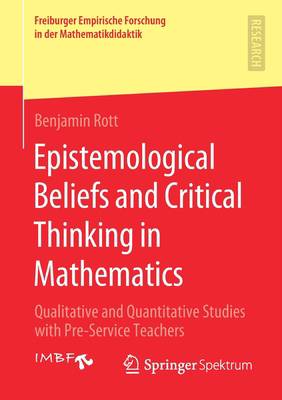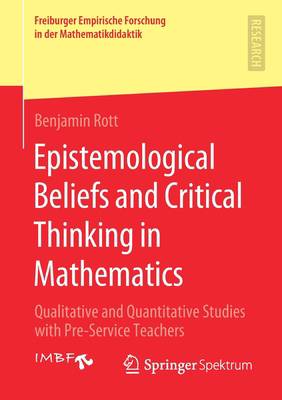
- Afhalen na 1 uur in een winkel met voorraad
- Gratis thuislevering in België vanaf € 30
- Ruim aanbod met 7 miljoen producten
- Afhalen na 1 uur in een winkel met voorraad
- Gratis thuislevering in België vanaf € 30
- Ruim aanbod met 7 miljoen producten
Zoeken
Epistemological Beliefs and Critical Thinking in Mathematics
Qualitative and Quantitative Studies with Pre-Service Teachers
Benjamin Rott
€ 52,95
+ 105 punten
Omschrijving
Epistemological beliefs--i.e. beliefs on the nature of knowledge, its limits, sources, and justification--play an important role both in everyday life and in learning processes. This book comprises several studies dealing with such beliefs in the domain of mathematics; amongst others a qualitative interview study, and quantitative studies for which a new questionnaire has been developed. In this new instrument, belief position (e.g. "mathematical knowledge is certain" vs. "uncertain") and belief argumentation (the way those positions are justified) are differentiated. Additionally, a test for mathematical critical thinking has been designed.The results show significant correlations between sophisticated belief argumentations and high scores in the critical thinking test, but no correlations regarding belief positions.
Specificaties
Betrokkenen
- Auteur(s):
- Uitgeverij:
Inhoud
- Aantal bladzijden:
- 162
- Taal:
- Engels
- Reeks:
Eigenschappen
- Productcode (EAN):
- 9783658335380
- Verschijningsdatum:
- 31/08/2021
- Uitvoering:
- Paperback
- Formaat:
- Trade paperback (VS)
- Afmetingen:
- 148 mm x 210 mm
- Gewicht:
- 222 g

Alleen bij Standaard Boekhandel
+ 105 punten op je klantenkaart van Standaard Boekhandel
Beoordelingen
We publiceren alleen reviews die voldoen aan de voorwaarden voor reviews. Bekijk onze voorwaarden voor reviews.











